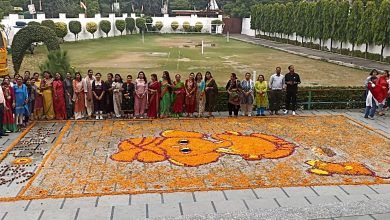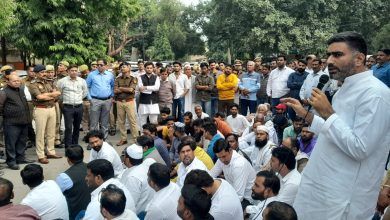Modi-Yogi’s Double Engine Government Created A New History Of Political Success In Uttar Pradesh

In the assembly elections in five states, the BJP got success in Uttar Pradesh, Uttarakhand, Goa and Manipur, while in Punjab the AAP surprised everyone by getting a thumping majority. In Punjab, the Congress had to face the consequences of its infighting. They were also wiped out for not coming together with the BJP and the Akali Dal, but the most shocking result was in Uttar Pradesh. Yogi Adityanath created history by regaining power with a thumping majority in the politically most important state. In the last 25 years, he became the first Chief Minister who has won the power of Uttar Pradesh for the second time in a row. Despite all the speculations, Akhilesh Yadav remained deprived of power. His claim of getting 400 seats proved to be a breeze. The SP is likely to get far more seats and almost seven per cent more votes than in 2017.
It is clear from the mandate of Uttar Pradesh that we cannot analyze politics through traditional prism. Three core trends changed the whole scenario. The state has moved from caste to class and from identity to aspiration and towards inclusive politics. Voters are determined to fulfill their aspirations by breaking the boundaries of caste, religion. How can political allegiance be permanent when the changing environment has broken even family and social allegiance? People’s political allegiances are changing rapidly. If it was not so, from where would the Yogi government get so many votes? The BJP not only protected its 2017 support base, but also increased it.

‘Sabka Saath, Sabka Vikas, Sabka Vishwas’ is not just a jumla but a reality, expressed in the mandate. The question is, how did the BJP convert it into reality? Chief Minister Yogi has an important role in this. Who made the basic objectives of governance like security and public welfare the basis of social development in the state. He vigorously fulfilled his politico-administrative obligations. Despite himself suffering in the covid epidemic, he readily stood in its management and went from city to city to see the treatment management, while the opposition parties did not take any such initiative. The manner in which Yogi resolved the serious problem of migrant laborers during the pandemic also made him popular. For the last two years, by giving free ration to each poor family twice, he gathered the blessings of the poor. Due to his strong political will, he treated the Muslims equally in all schemes without appeasing them. The previous governments continued to use Muslims as vote banks by infusing them with the fear of the BJP and instilling in them the feeling of being a ‘victim’, cutting them off from the mainstream.
In the last five years, neither there were riots in UP nor did any Muslim can point out any Yogi’s work , which smacks of discrimination. That’s why about 18 percent of Muslims voted for the BJP this time as compared to nine percent in 2017. Muslim women also contributed to Yogi’s victory. In western UP, Jat-Muslim alliance discourse was propagated and it was said that the SP-RLD alliance would reduce the distance between them. This was a similar experiment that Akhilesh did with Mayawati in 2019 to unite the Dalits and Backwards. This time in western UP, BJP got 71 percent or 36 percent more Jat votes as compared to 34.5 percent in 2017. Since the BJP got 91 per cent Jat votes in 2019, there has been a decrease of 20 per cent in comparison.
The vote share of the SP alliance is expected to increase from 29 per cent in 2012 to around 35 per cent. This increase came from 80 percent Muslim and 20 percent Jatav support. Akhilesh’s estimate was correct that he was getting about 35 percent votes, but the whole game was spoiled by the BSP, whose 40 percent Jatav votes went to the BJP. This was Akhilesh’s third unsuccessful experiment. Earlier in 2017, he had an alliance with Congress, in 2019 BSP and this time with many smaller parties. However, he forgot that the more candidates the alliance had, the more seats he would not only weaken him, but he would also harm him for not being able to transfer the SP votes to the coalition candidates. Blaming the defeat on ‘EVMs’ is an insult to the mandate, which will further damage the party. If the SP is to be successful, then it has to strengthen its ideological base, party organization and collective leadership and its traditional ‘
Mayawati’s traditional voter was definitely committed, but now the Dalit has understood that Behenji has moved away from her and she is getting all the benefits from the ‘lotus flower’. Almost all the MPs and MLAs of reserved seats in the state are from the BJP, which is making good inroads of the party among the Dalits. Congress disappointed despite all efforts of Priyanka. The party ideology, organization and leadership at all three levels seems to have become directionless and has forgotten the first step of successful politics, ‘connection with the people’. ‘Social engineering’, not a Kharif or Rabi crop, which is harvested in three-four months, will have to be permanently intertwined with a ‘political crop rotation’ to be effective. This situation is deplorable for a national party.
Prime Minister Modi also has a big hand in Yogi’s victory, because about 11 percent voters voted for BJP only because of Modi. Even though people have praised the Chief Minister for peace-keeping, women’s security, free-ration and covid-management, but the issues of inflation, unemployment and stray cattle are serious, on which prompt action is necessary. People were also troubled by the inaction, inaction and hunger for corruption of BJP MLAs. This is against the image of Yogi and Modi. People did not want to disturb the security, peace and development, so for the first time in 25 years, they have created history by giving a chance to a government again. In fact, the effect of the double engine government was seen in UP, the same thing happened in Goa, Manipur and Uttarakhand.



